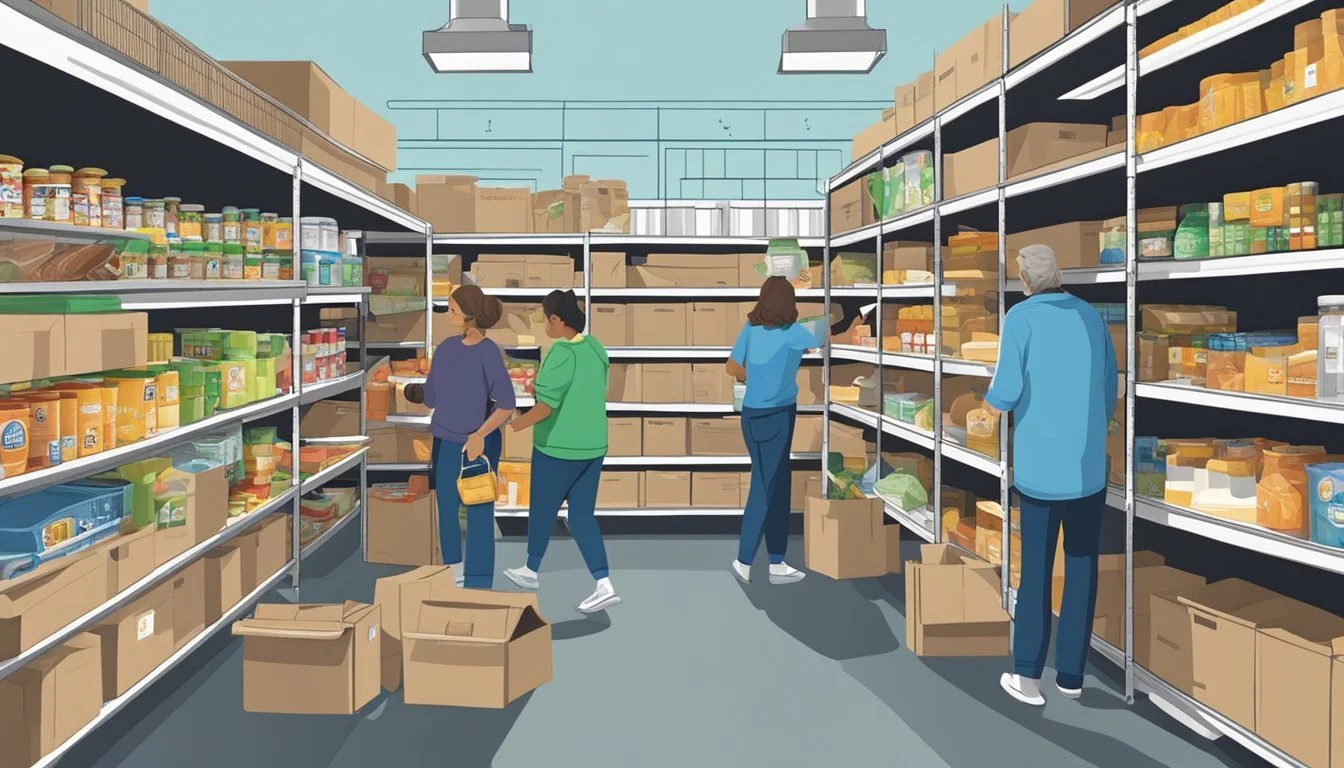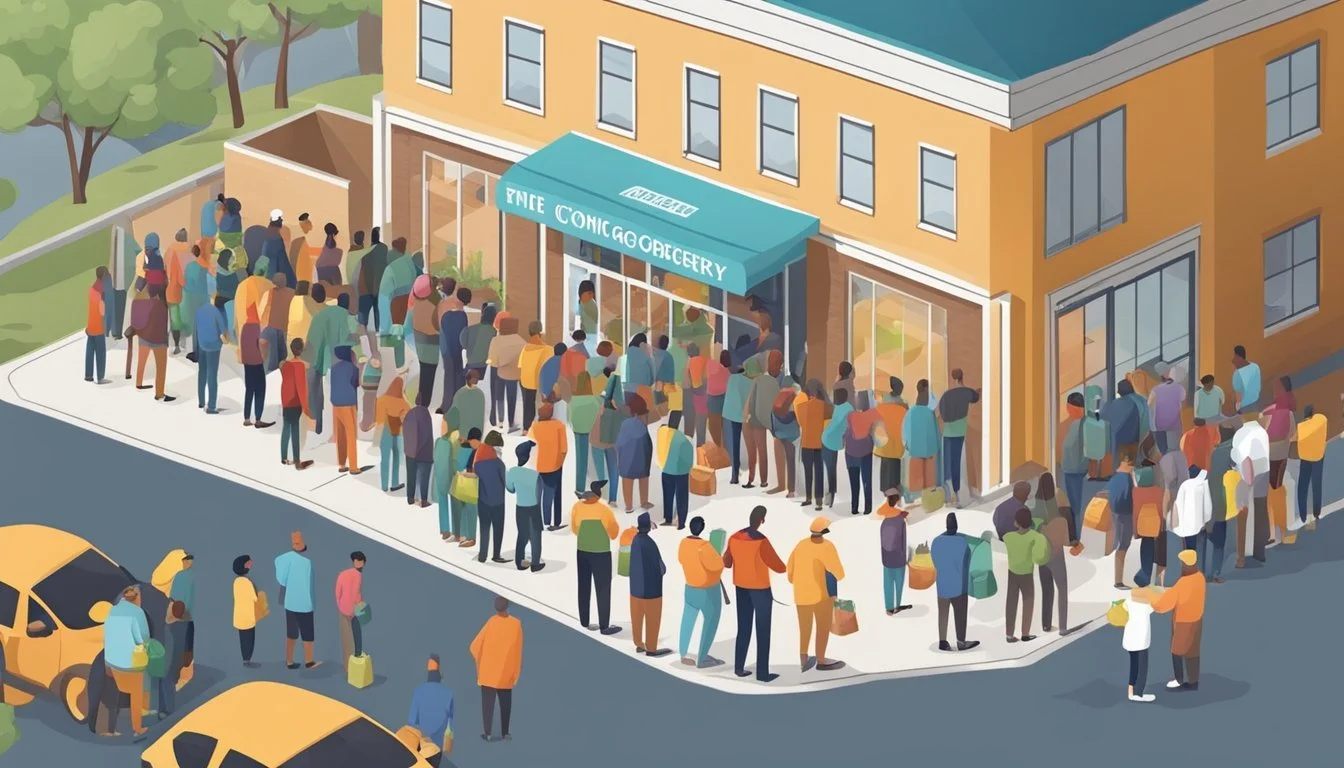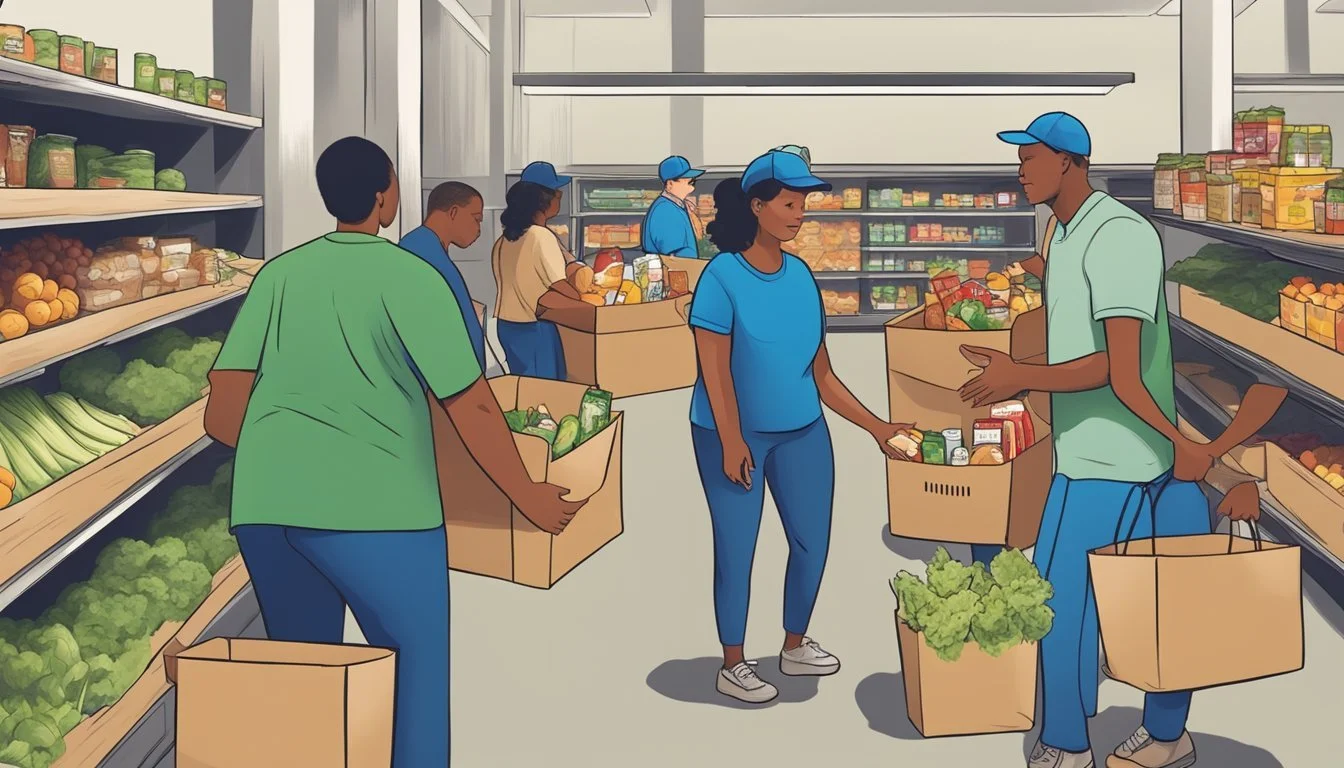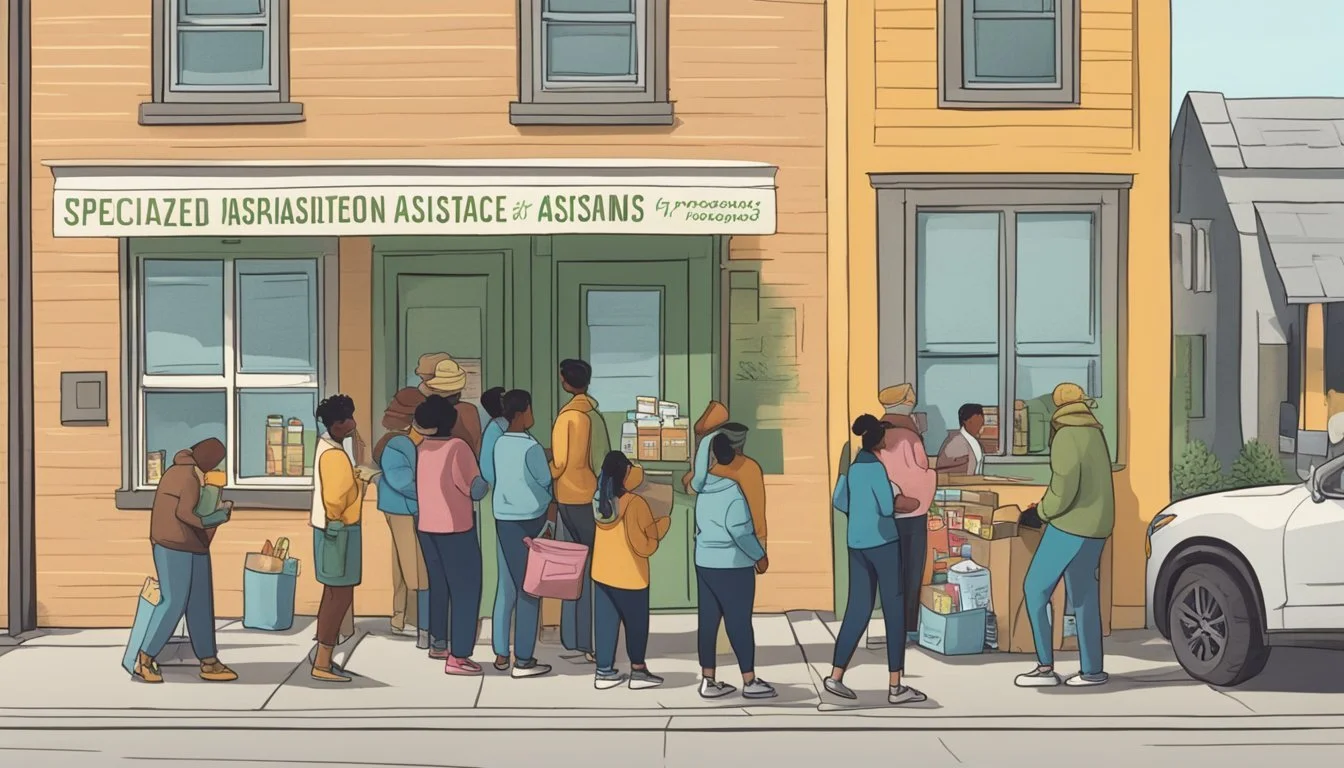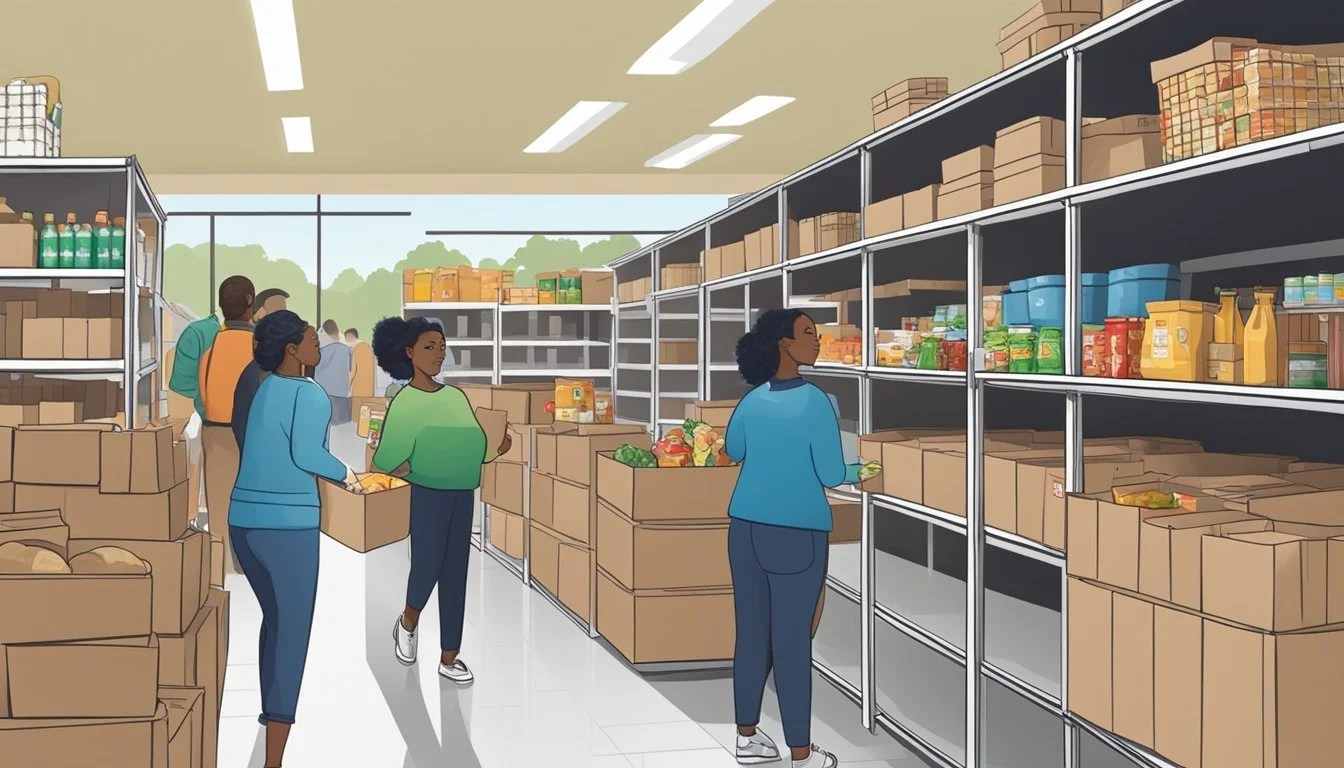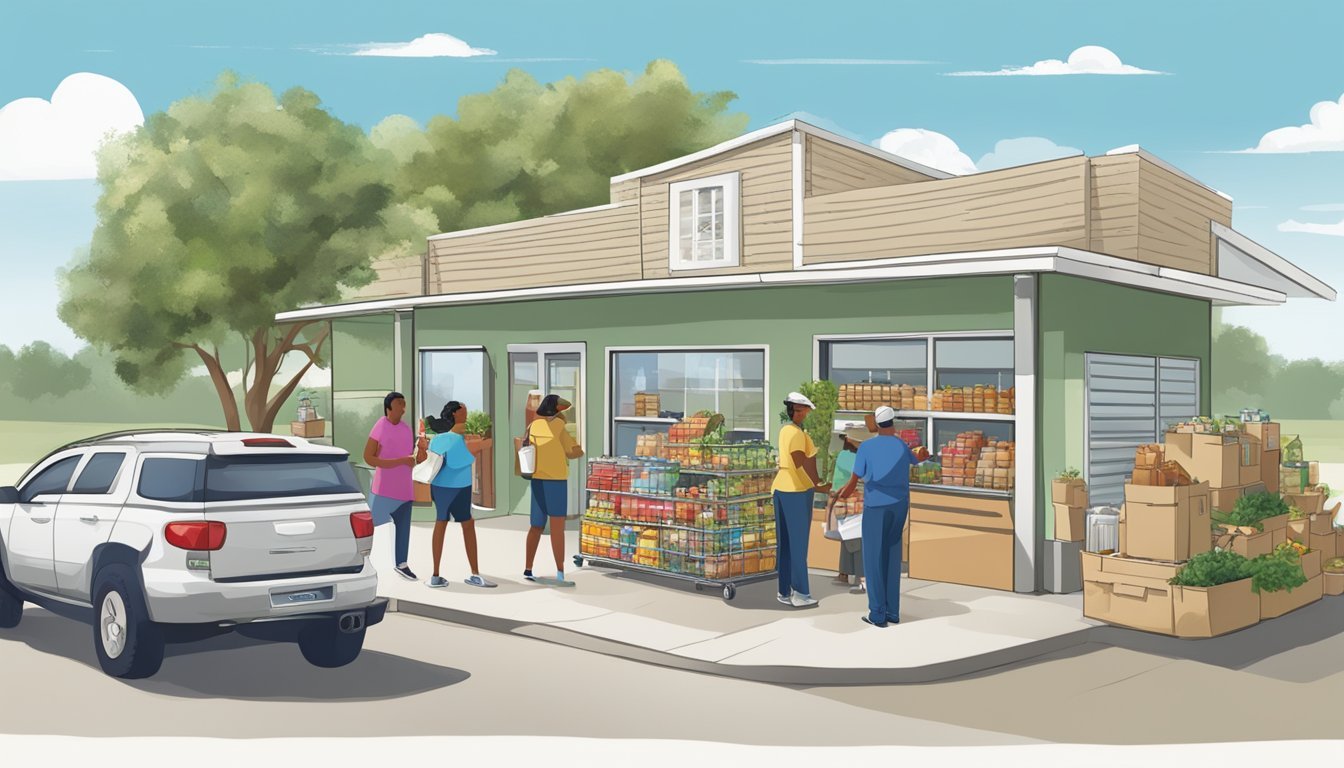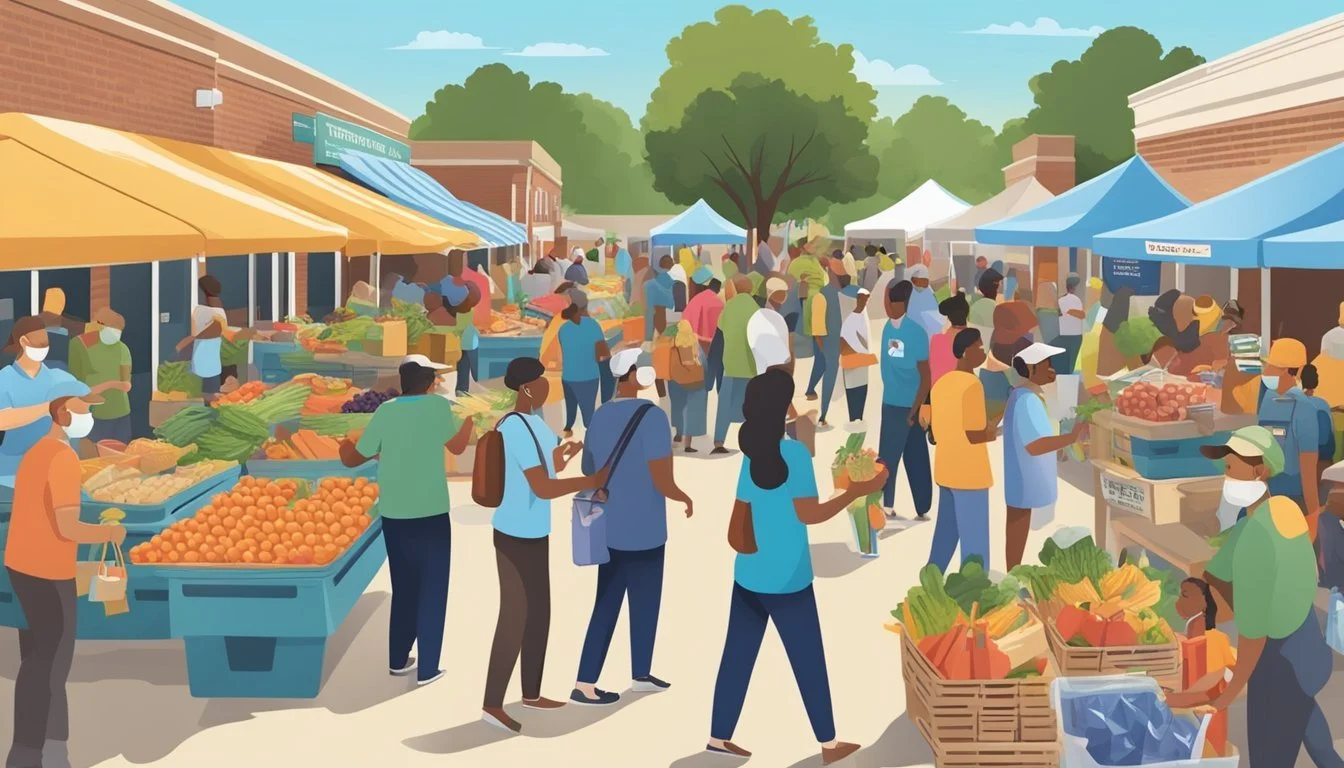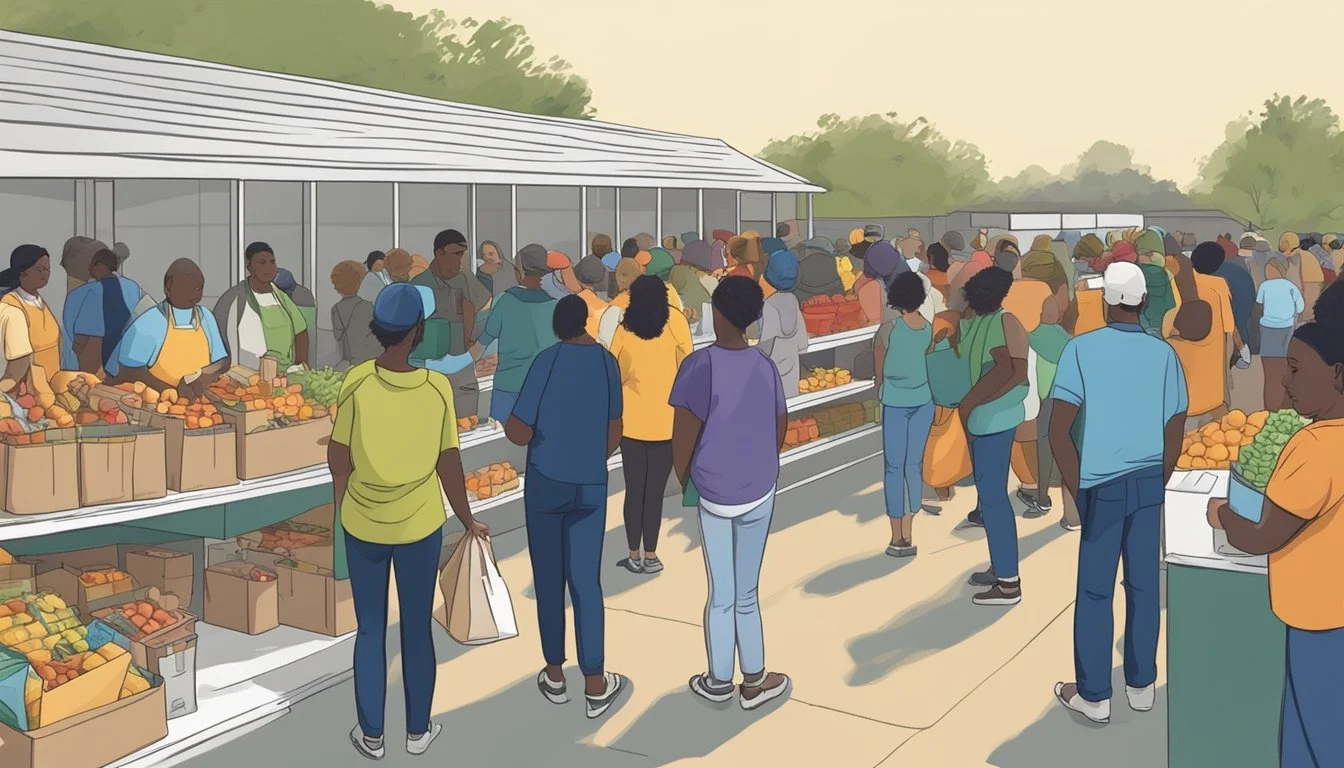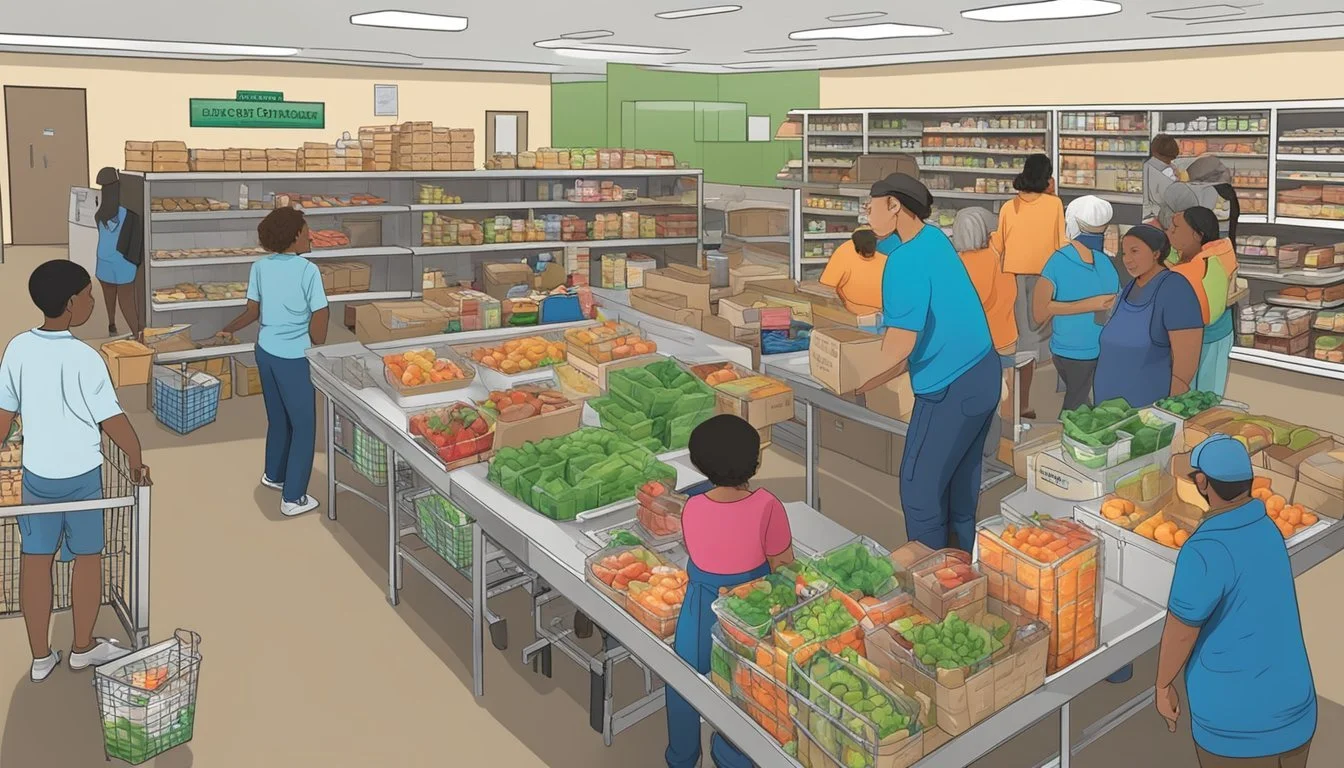Free Groceries and Food Pantries in Lee County, Texas
Your Ultimate Guide
This Article is Part of Our Guide on Free Groceries in Texas
In Lee County, Texas, several food pantries provide invaluable service to the community by offering free groceries to individuals and families facing food insecurity. These pantries are vital resources ensuring that no one in the area goes hungry, reflecting a wider network of support across the state. They operate on the principles of compassion and assistance, often supported by volunteers, local charities, and partnerships with organizations like the Central Texas Food Bank.
The Giddings Food Pantry, for instance, is one such entity where residents can access a variety of nutritional groceries. They conduct distributions on specific days of the month, ensuring that both perishable and non-perishable items reach those in need. Similarly, Helping Hands Food Pantry in Lee Texas is another example of a faith-based organization that lends a helping hand by providing a week's supply of groceries and personal care items to anyone in need, sans the requirement of sharing their religious beliefs.
Additionally, innovative distribution methods like drive-thru pantries facilitated by networks such as Feeding America increase accessibility for those who may face transportation challenges or prefer a contactless option. This model allows residents to receive food directly to their vehicles, highlighting the adaptability and commitment of these pantries to serve their communities effectively.
Understanding Food Assistance in Lee County
In Lee County, Texas, individuals and families in need can access a range of food assistance programs. These services are often provided by a collaboration of local agencies, nonprofit organizations, and government programs aimed at addressing food insecurity.
Government Assistance: One major source of food aid comes from the Supplemental Nutrition Assistance Program (SNAP), formerly known as food stamps. SNAP offers monthly benefits to eligible low-income individuals and families which they can use to buy groceries.
Local Food Pantries and Soup Kitchens: Additionally, a network of food pantries and soup kitchens operated by various organizations offers immediate food relief. These centers often have set hours and may require proof of residency, as seen in some pantries serving Lehigh Acres residents.
Referral Services: Residents may also contact referral services for more information on available food assistance. These services guide individuals to the right agencies and help them navigate the requirements and application processes.
Community Mobile Food Pantry: Delivers food directly to communities
Meals on Wheels: Provides meals to the elderly or homebound
Community Cafés: Offer free or low-cost meals in a social setting
Eligibility & Access: Eligibility for these programs can depend on income, family size, and need. Local social services can provide assistance with the application process and help determine which programs an individual or family may qualify for.
Residents are encouraged to contact these programs directly or utilize referral services to gain comprehensive understanding of the food assistance available in Lee County.
Directory of Food Pantries and Soup Kitchens
Lee County, Texas, offers a robust support system for residents needing food assistance. Below is detailed information about the local food pantries and soup kitchens, including where to find them, how to get help, and when they are open.
Location and Contact Information
Lee County food banks provide free groceries to individuals and families in need. Residents can locate pantries and soup kitchens through various directories available online or by contacting local non-profit organizations.
Feeding America Food Bank
Address: 123 Main St, Lee County, TX
Contact: (555) 123-4567
Community Soup Kitchen
Address: 456 Elm St, Lee County, TX
Contact: (555) 234-5678
Eligibility Requirements
To receive food assistance, individuals often need to provide proof of residence within the specific zip code and may need to meet certain income guidelines. Some programs may have additional requirements such as identification or proof of family size.
Feeding America Food Bank: Serves residents of Lee County; income verification may be required.
Community Soup Kitchen: Open to all, no eligibility requirements for meal services.
Hours of Operation
The hours of operation vary for each location, and it is advisable to contact them directly or visit their website for the most current information.
Feeding America Food Bank
Hours: Wednesday, 11:30 am - 1:30 pm; 5:00 pm - 7:00 pm
Note: Clients can visit once a month.
Community Soup Kitchen
Hours: Open daily, 12:00 pm - 2:00 pm
Types of Food and Services Provided
Food assistance in Lee County, Texas, is provided through a variety of channels including food pantries and subsidized grocery programs. These services offer vital sustenance ranging from fresh produce to dairy products for individuals and families in need.
Available Food Items
Food pantries in Lee County typically offer a diverse array of food items to ensure balanced nutrition. The distribution often includes:
Produce: A selection of fresh fruits and vegetables to promote healthy eating habits.
Meats: Various types of meat, providing essential protein to individuals and families.
Dairy: Items such as milk and cheese to fulfill daily calcium and vitamin D requirements.
Canned Groceries: A variety of canned fruits, vegetables, and protein-rich foods like beans and fish for longer shelf life.
Baby Formula: For households with infants, baby formula is sometimes available to support the growth and health of the youngest community members.
Specialized Services
In addition to providing staple groceries, Lee County offers specialized services tailored to meet the unique needs of its residents:
Meals on Wheels: A service delivering prepared meals to seniors and individuals with disabilities who may have mobility challenges.
Subsidized Groceries: Programs that offer food at reduced costs to stretch limited household budgets further.
Soup Kitchens: Facilities that provide hot, prepared meals, serving as a community gathering spot for those requiring immediate nourishment.
These services collectively work to ensure that no one in Lee County goes without the basic necessity of food.
Maximizing Community Resources
In Lee County, citizens have access to a variety of programs aimed at supporting those in need with food assistance. These community resources are geared towards providing not just sustenance, but also nutritional guidance and special event-based assistance to ensure no one goes hungry, regardless of the season or circumstance.
Soup Kitchens and Meal Sites
Soup kitchens and community meal sites serve as crucial resources, offering immediate food relief to individuals and families. They often function as more than just food distribution points; they are also places where people can find companionship and support. Lee Health, for example, facilitates community meal sites and transient soup kitchen services to cater to the ongoing needs of the vulnerable populations.
Community Cooperative is renowned for their Meals on Wheels program, and their community cafes extend daily nourishment to those who might otherwise go without.
Holiday and Special Program Assistance
During holidays, the need for communal support often rises, as do the services available. Lee County is home to several holiday meal programs and special assistance services that ensure seasonal festivities are met with adequate meals for everyone.
The Broadway Community Church Food Pantry exemplifies the holiday spirit, often hosting holiday meals (What wine goes well with holiday meals?) and providing food baskets to spread cheer among the less fortunate.
By engaging with these services, residents of Lee County can find the support they need to navigate through tough times with dignity, ensuring access to nourishing meals and holiday support.
Engaging With Local Food Banks
Local food banks play a crucial role in Lee County by addressing hunger and providing assistance to those in need. They function as part of a larger non-profit network, often in partnership with national organizations like Feeding America.
Volunteering and Donations
Volunteers are the backbone of food banks, contributing time and effort to sort, pack, and distribute food. Individuals looking to volunteer can contact their local food bank to find out specific needs and scheduling. Donations, both monetary and in-kind, fuel the operations of food banks. Donations of non-perishable food items are always welcomed, and monetary contributions are utilized to purchase essential food supplies in bulk, allowing for the stretching of dollars to serve more individuals and families.
How to Volunteer:
Contact the local food bank directly to inquire about volunteering opportunities.
Complete any required training or orientation sessions.
How to Donate:
Donate online through the food bank's official website or in person at designated drop-off points.
Organize a community food drive to collect non-perishable items.
Partnership Opportunities
Food banks actively seek partnerships with local businesses, schools, and community organizations to enhance their reach and impact. Such partnerships can take the form of food drives, fundraising events, or sponsorships. These collaborative efforts not only provide the necessary resources to combat food insecurity but also strengthen community ties and awareness.
Potential Partners: Businesses, schools, community groups, and individual philanthropists.
Benefits of Partnership:
Increase the food bank's capacity to serve.
Enhance the visibility and corporate social responsibility profile of the partnering entities.
Specialized Assistance Programs
The community in Lee County, Texas, benefits from specialized assistance programs designed to address the nutritional needs of various groups. These programs offer tailored support, often in the form of vouchers, to ensure access to nutritious food for those most in need.
Women, Infants, and Children (WIC)
The Women, Infants, and Children (WIC) program provides vital nutrition assistance to pregnant women, new mothers, and children under the age of five. Participants receive nutritional education, healthcare referrals, and vouchers that can be exchanged for healthy food items at participating stores. WIC is known for its focus on education and preventative health measures, which contribute to long-term well-being.
Seniors and Disability Services
Seniors and individuals with disabilities in Lee County can take advantage of assistance services tailored to their unique needs. Meals on Wheels is one such program that delivers nutritious meals directly to the homes of those who are unable to prepare food themselves. Additionally, programs like those offered by the Salvation Army provide both meals and socialization opportunities, focusing on improving the quality of life for these populations.
Additional Support Services
Lee County residents in need of free groceries and food pantry services have access to a variety of additional support services. These services are designed to provide holistic care and support to individuals and families, ensuring their needs go beyond just nutritional sustenance.
Nutritional Education and Counseling
Nutritional education and counseling is a critical component of the support services offered in Lee County. Organizations like the Salvation Army dedicate resources to helping residents understand the importance of a balanced diet and how to make healthy food choices. Nutrition counseling is often provided by qualified professionals who guide individuals through the processes of meal planning and understanding nutritional labels, which is key to long-term health and well-being.
Support Beyond Food
Beyond the essential nourishment provided by food pantries, Lee County services extend further to meet additional needs:
Toiletries: Essential non-food items, such as hygiene products, are available, ensuring that personal cleanliness is maintained.
Clothing Closets: Gently used clothing is offered to individuals and families, assisting them with proper attire for various seasons and occasions.
Counseling Services: Some organizations in Lee County offer counseling services, giving emotional and psychological support to those facing hardships.
These comprehensive services ensure that the residents of Lee County have their basic needs met while also receiving support that contributes to their overall well-being.
Finding Local Assistance by Zip Code
In Lee County, Texas, residents seeking food assistance can locate local pantries through a search by zip code. This method streamlines finding relevant aid close to home.
Each zip code in Lee County is served by a network of local food pantries equipped to provide groceries and basic necessities to individuals and families in need. Residents can utilize online resources or community directories to pinpoint the nearest food assistance options within their specific area.
Here's a brief guide on how to proceed:
Conduct an Online Search: Use keywords like "Lee County food pantries" followed by your zip code.
Visit Local Websites: Websites such as Feeding America provide zip code search tools to find nearby food banks.
Check Community Boards: Often, local supermarkets or community centers host bulletin boards listing local food assistance resources.
For example, a resident living in the 78942 zip code would find their local food pantry information by using the search term: "Food pantries in 78942."
Zip Code Local Pantry Resources 78942 Feeding America Member Food Bank 77853 Community-Supported Pantry
In summary, Lee County residents can find local pantries in their vicinity by using their zip code. These efforts ensure that help is within reach for those who need it, reinforcing the community's commitment to supporting its members' needs.
Operating a Successful Food Pantry
To achieve success in operating a food pantry in Lee County, Texas, coordinators must pay careful attention to its establishment and adhere to operational best practices, ensuring a range of services are delivered in a convenient and effective manner.
Establishing a Food Pantry
When establishing a food pantry, consider the range of services to be offered and how to make them convenient for the community. The choice of a location should be accessible, and the design can include pantry pictures or signage to make it welcoming. Drive-thru pantry models have emerged as a practical solution for food distribution, offering convenience for both volunteers and patrons.
Establishment steps:
Secure a suitable location with parking for a drive-thru pantry if possible.
Determine the criteria for receiving food, such as residency or income level.
Operational Best Practices
Once a food pantry is established, implementing operational best practices is crucial for sustainability. Key practices include maintaining clear records of services, efficient inventory management, and engaging the community for support.
Operational checklist:
Ensure food is stocked and presented neatly; use clear labels and pantry pictures if possible.
Set criteria for orderly distribution to individuals and families based on need.
Create a volunteer rota for tasks such as ordering stock, client screening, and funds management.
By adhering to these guidelines, a food pantry can become a reliable resource for those in need within the community.
Countywide Initiatives and Networking
In Lee County, Texas, coordinated efforts among various entities have established a robust system to provide free groceries and food assistance to those in need. This network harnesses the strengths of nonprofits, agencies, charities, and local churches, including organizations like St. Vincent, to create a wide-reaching and efficient distribution system.
County Partnerships
Nonprofit organizations and local government agencies in Lee County have formed strategic partnerships to ensure food security. A key example is the relationship between agencies and St. Vincent, a charity known for its community support programs, which leverages their extensive network to distribute food effectively. Churches in the area often collaborate with these entities, hosting food pantries and drives, and contributing to the overarching network of support.
Partners: Nonprofits, St. Vincent, Local Agencies
Services: Food Pantries, Distribution Drives
Locations: Various Churches, Community Centers
Creating a Collaborative Network
The success of food assistance programs in Lee County hinges on a well-coordinated network that includes charities working alongside churches and other nonprofit organizations. This network ensures that services such as mobile food banks and drive-thru pantries are accessible to a broader demographic. Collaboration also facilitates the sharing of resources and information, optimizing the reach and impact of these initiatives.
Collaboration Tools:
Shared Schedules for Mobile Food Banks
Central Information Hub for Drive-Thru Pantries
Network Members: Nonprofit Organizations, Charities, Churches, Mobile Food Providers
Objective: Maximize Reach and Efficiency of Food Distribution
Legal and Regulatory Aspects
In Lee County, Texas, food pantries and free grocery programs operate within a structured framework of regulations. These entities are closely monitored to ensure they meet health, safety, and operational standards mandated by local and federal law.
Compliance with Regulations
Food assistance entities are required to adhere to a comprehensive set of regulations to ensure safe and equitable distribution of food. Government agencies such as the USDA (United States Department of Agriculture) set forth guidelines that food pantries must follow. These guidelines cover aspects such as:
Storage and Handling: Ensuring that food is stored and distributed in a safe manner to prevent contamination and spoilage.
Record Keeping: Maintaining accurate records of food sources, inventory levels, and distribution to eligible individuals.
Food pantries in Lee County must also comply with the Texas Department of Agriculture regulations and any local health department rules, which may include:
Regular health inspections
Proper staff and volunteer training
Sanitation and cleanliness protocols
Advocacy and Public Policy
Food pantries often engage in advocacy efforts to influence public policy that affects food security. They communicate with policymakers to highlight the needs of the community and the impact of current regulations. By doing so, they work towards:
Enhancing government support for food assistance programs.
Shaping public policy to address systemic issues that lead to food insecurity.
These organizations may collaborate with local government bodies to address gaps in food services or advocate for changes in regulations that can streamline the process of food distribution.
Leveraging Online Resources
Residents of Lee County, Texas, can utilize a variety of online tools to access free groceries and food pantries. The Internet offers directories and social media platforms that serve as pivotal resources for those in need of food assistance.
Online Directories and Databases
Directories on the World Wide Web play a crucial role for individuals seeking food aid. They provide comprehensive lists of services and contact details. For example, Lee County residents might come across an online guide that furnishes information on the locations, hours of operation, and eligibility requirements of various food pantries. Such online databases are regularly updated, ensuring community members have access to the latest information.
Search results can lead to online platforms like Feeding America or local non-profit organizations’ websites which often contain sections dedicated to food assistance programs. Utilizing these databases, residents can filter resources by criteria such as proximity, types of food offered, or special programs for groups like veterans or families with children.
Social Media and Outreach
Social media serves as an important avenue for food pantries and charity organizations to reach out to those in need and broadcast their services. Organizations often post real-time updates, emergency food drives, and event announcements on platforms such as Facebook and Twitter.
They also provide a space for community interaction, where residents can share their experiences and support each other in finding food resources. Social media outreach often leverages hashtags and location-based groups, making it easier for individuals to find help in their immediate vicinity and stay informed about local opportunities for food assistance.
Regional Overview of Assistance
In Lee County, Texas, residents facing food insecurity have the potential to access a variety of food assistance services. These supports range from food pantries to statewide services, each varying in scope and availability.
Comparison with Neighboring Counties
Lee County's provision of free groceries and food pantry services can be compared with neighboring counties to assess regional support variations. For instance, Houston, located in Harris County, operates one of the largest food banks in the country, the Houston Food Bank, which can serve as a valuable resource for surrounding areas, including Lee County. Adjacent counties like Bastrop and Caldwell also offer similar services but may have different operating hours and eligibility requirements, indicating Lee County residents may have access to an expanded network of support.
In comparison, smaller counties like Anderson and Bowie may have fewer resources, but they often collaborate with larger entities or statewide programs to ensure residents' needs are met. Moreover, metropolitan areas such as Fort Worth and Austin boast a broad array of assistance programs, from community gardens to emergency food services, potentially providing insights and models for service expansion in Lee County.
Statewide Support Services
Statewide, Texas operates several food assistance services, benefitting counties like Lee:
Texas Supplemental Nutrition Assistance Program (SNAP): Available to qualified residents state-wide, including those in Lee County and cities like Abilene, Commerce, and Cleveland.
Texas Food Bank Network: Collaborates with various counties, including Lee, enhancing food security by distributing resources through agencies like Amarillo and Collin County Food Banks.
Statewide Programs:
School meal programs
Senior nutrition programs
This state-wide reach ensures a safety net is provided, not just in individual counties but across a spectrum of Texas communities, including those in Bandera, Bryan, and Cameron. In essence, Lee County, while maintaining its own local assistance initiatives, is part of a larger statewide effort to combat hunger and enhance food accessibility.


